Sir John Monash, Personal Files Book 16, 3 September - 9 October 1917, Part 9
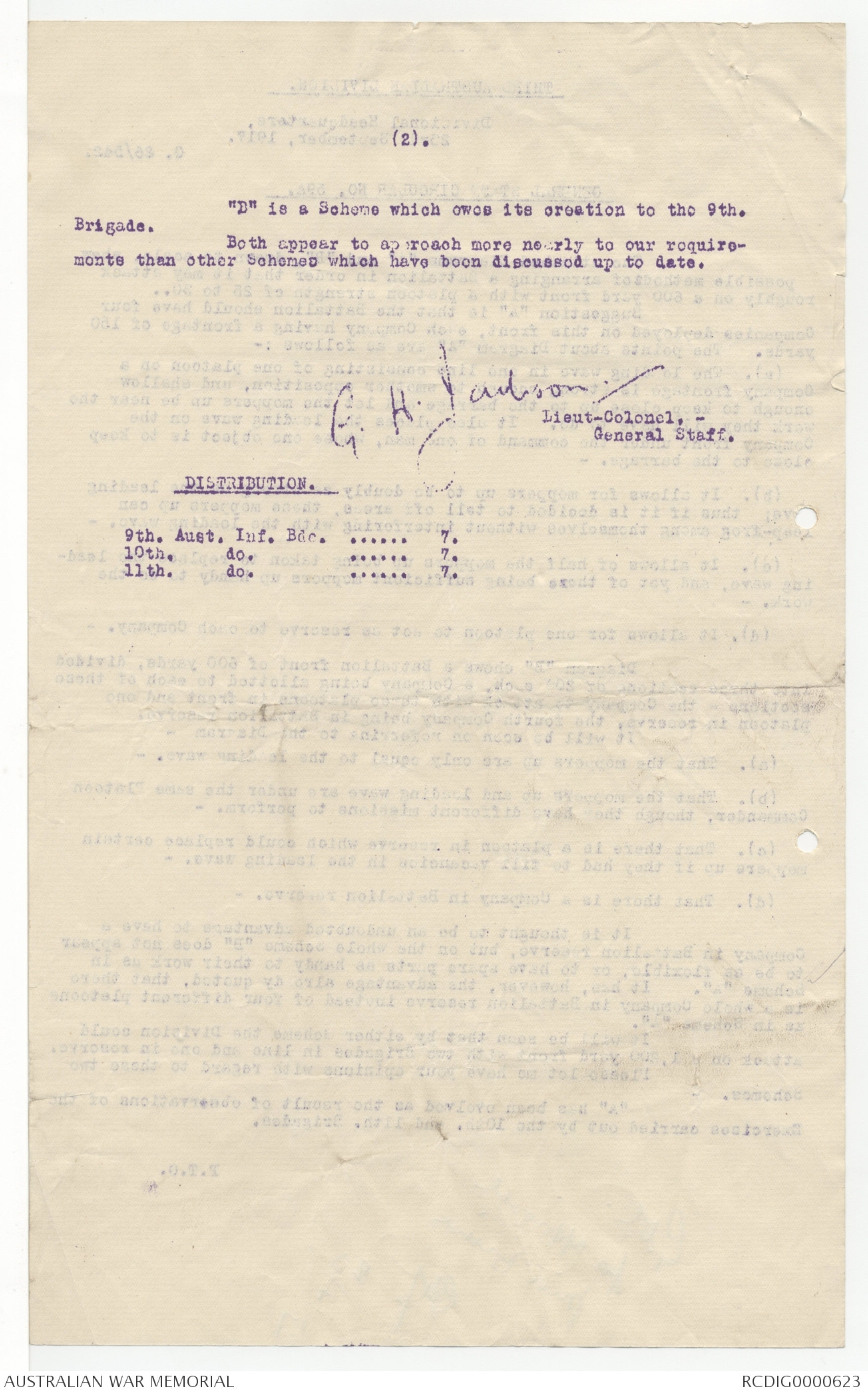
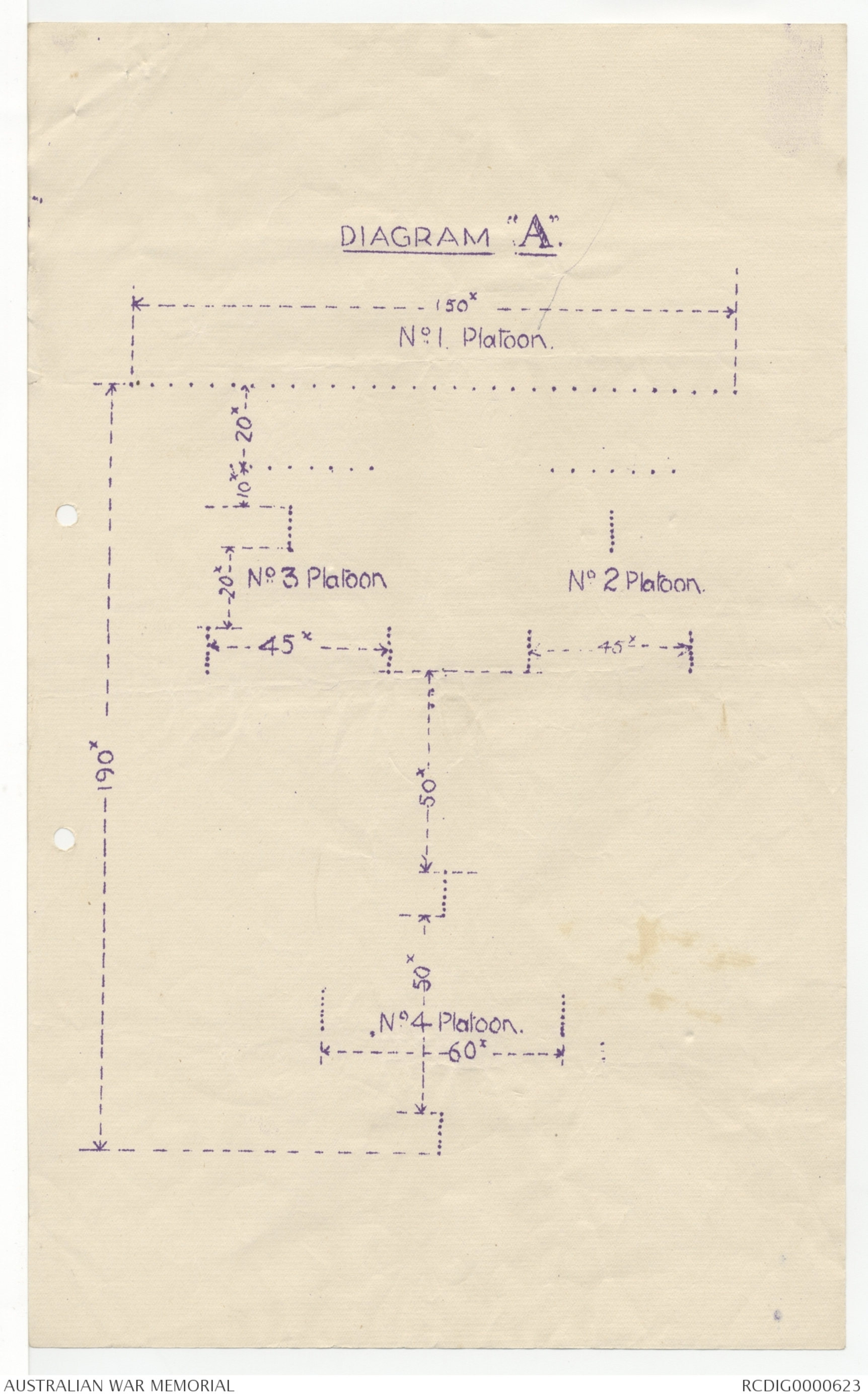
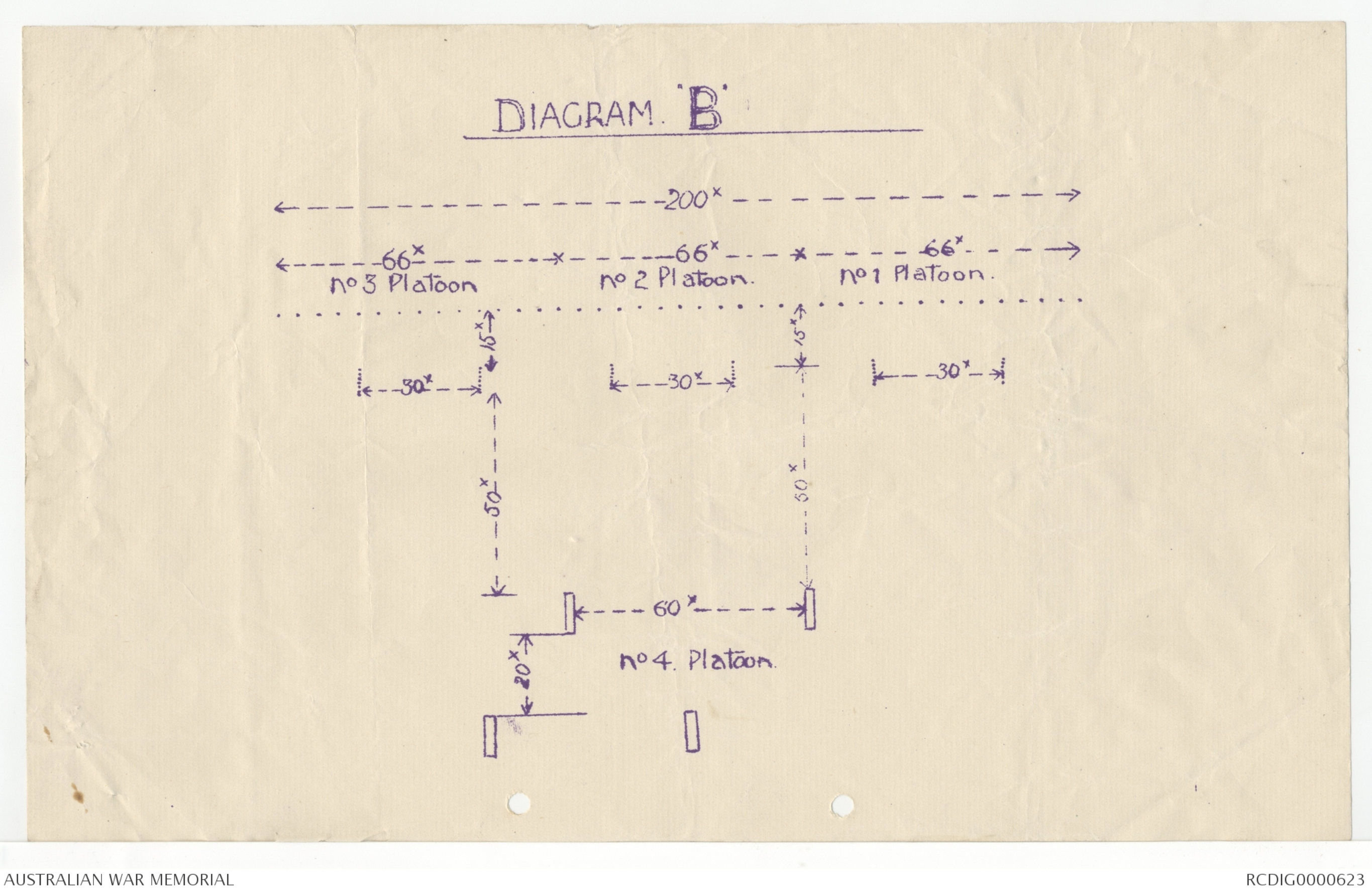
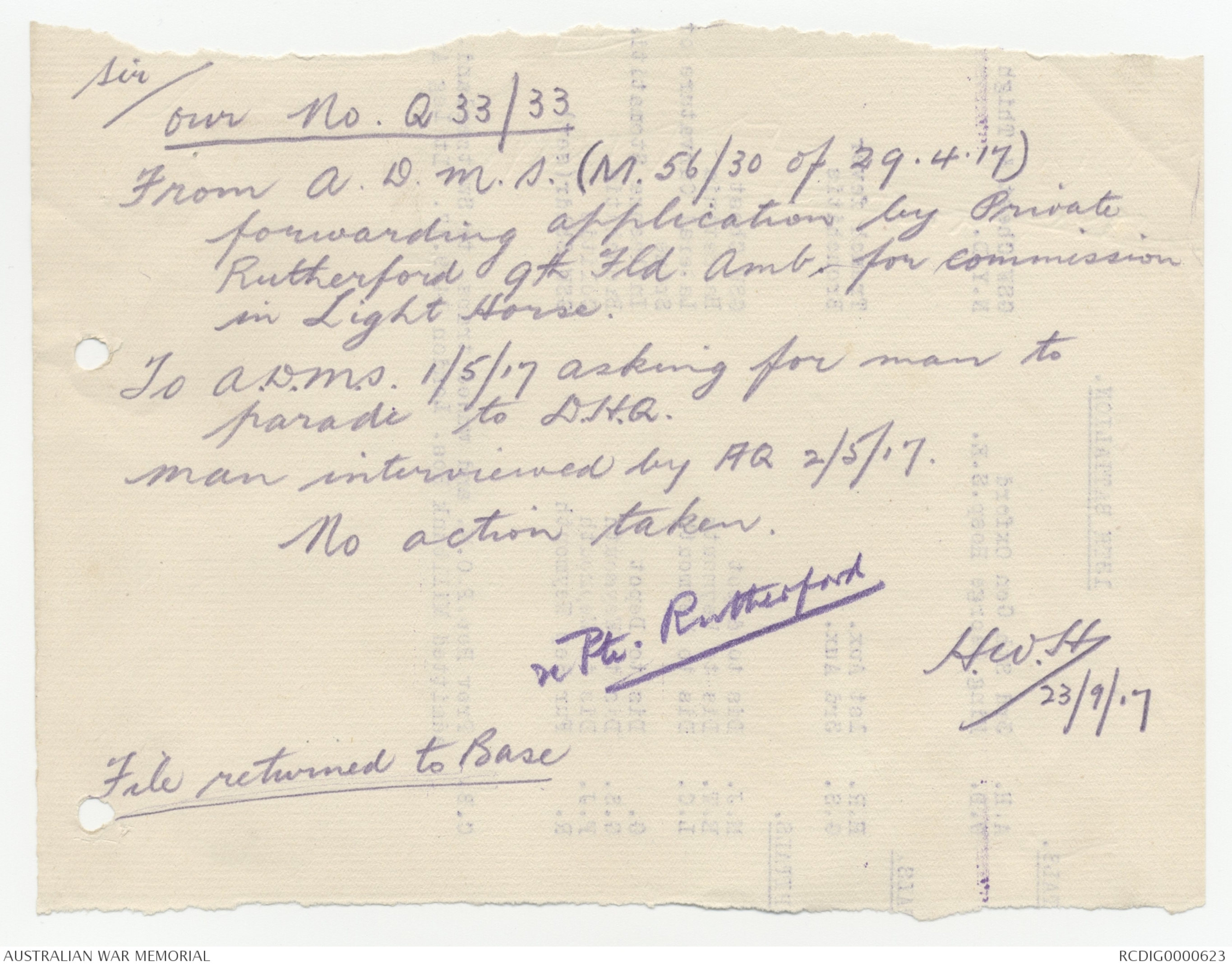
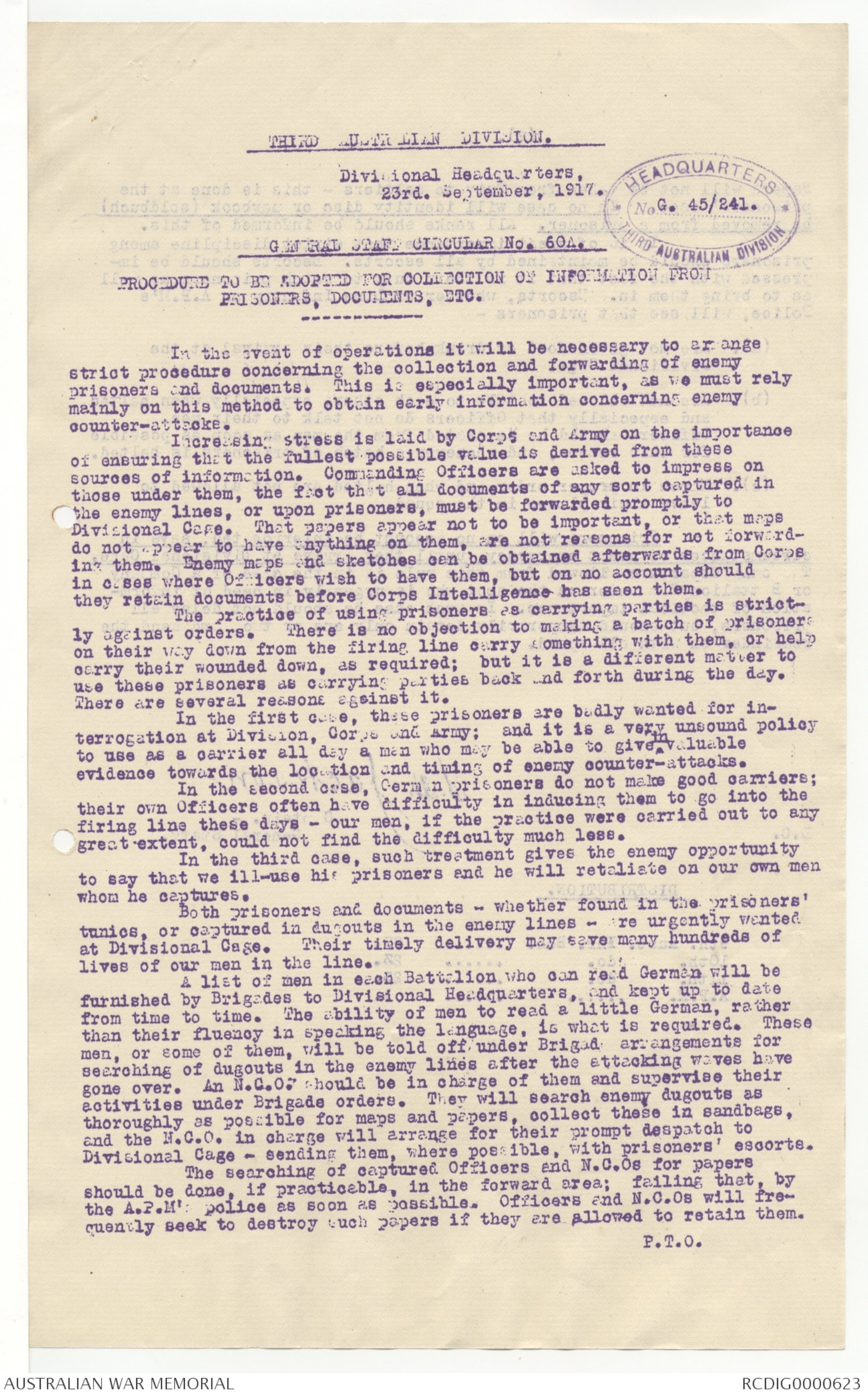
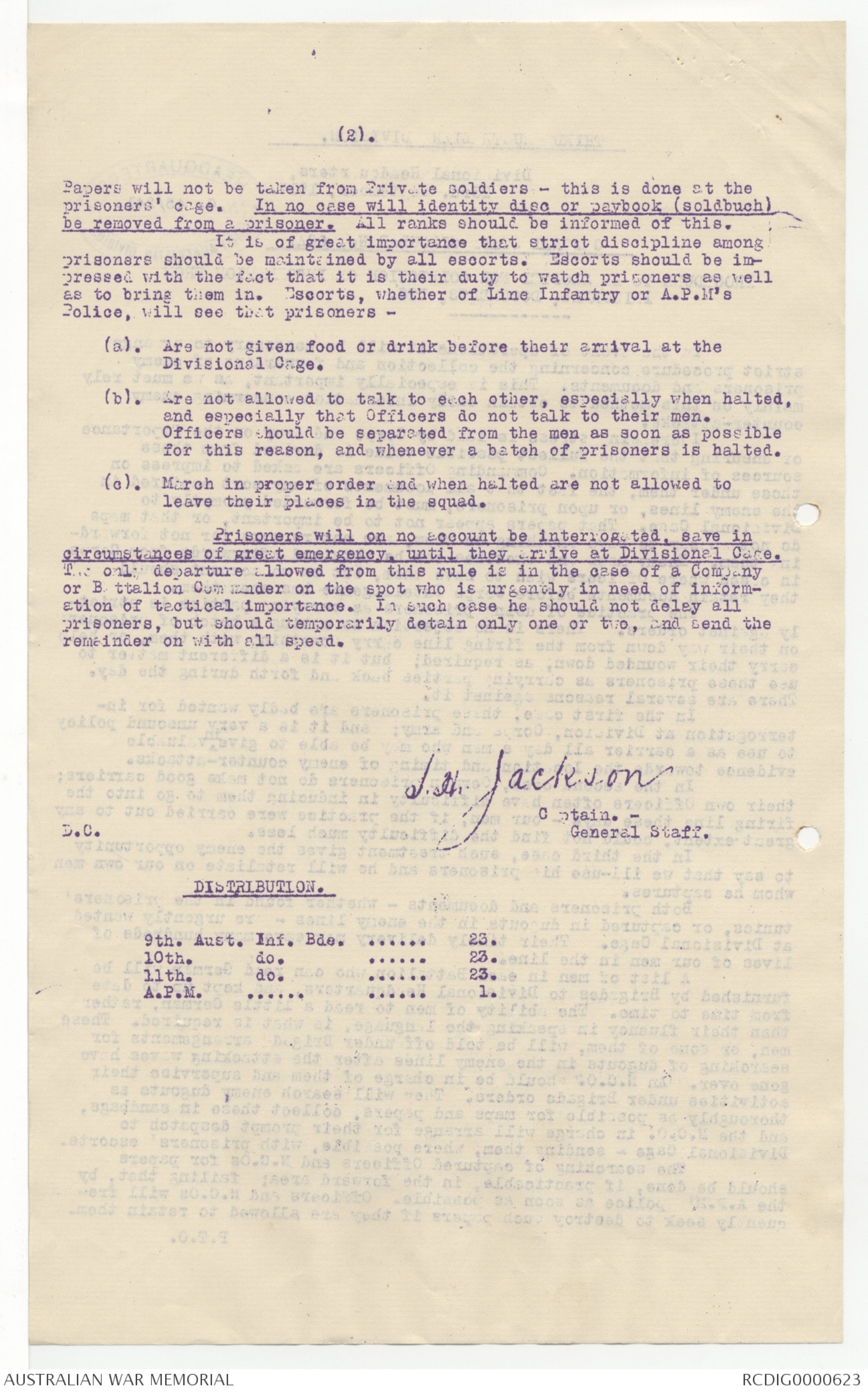
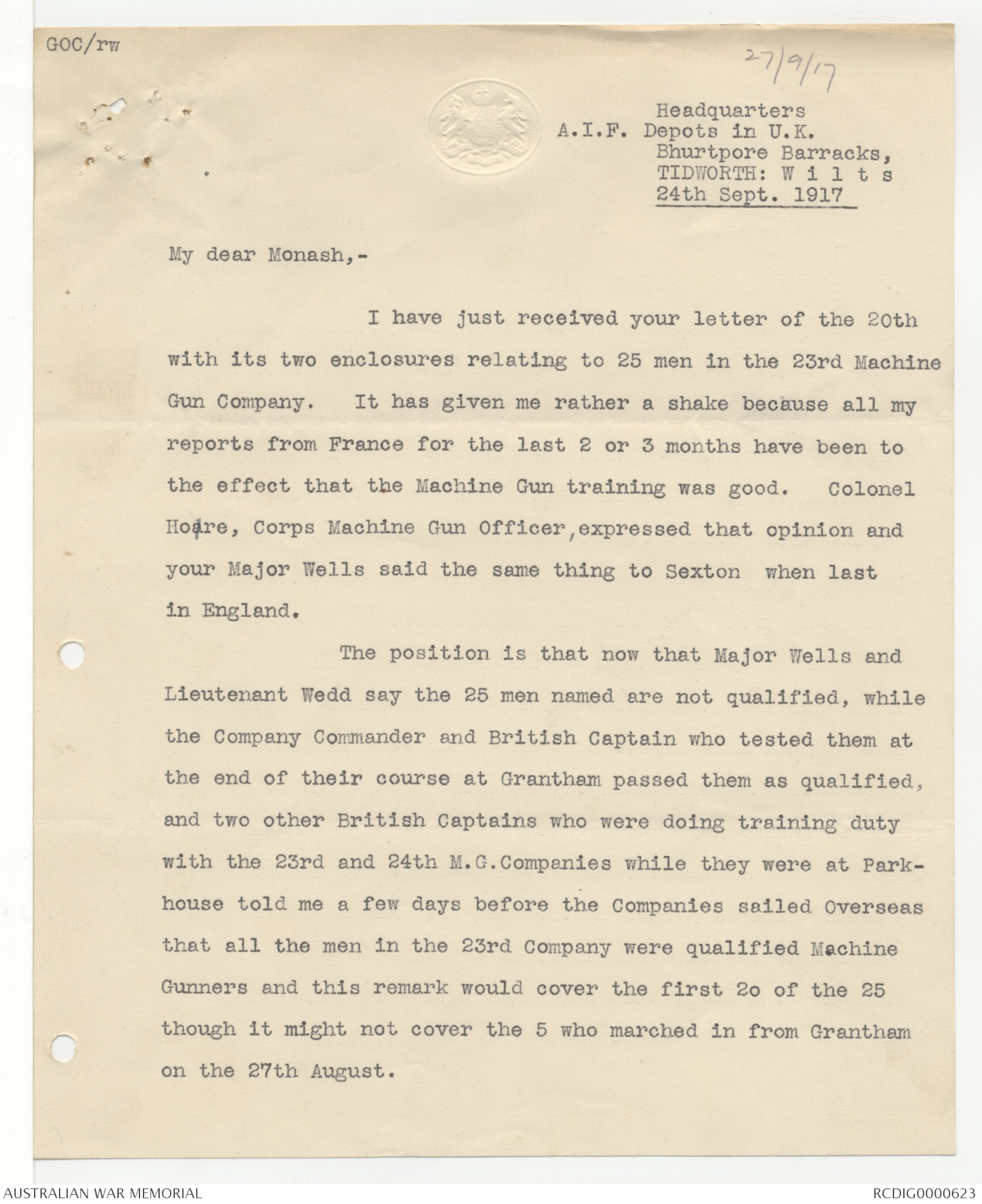
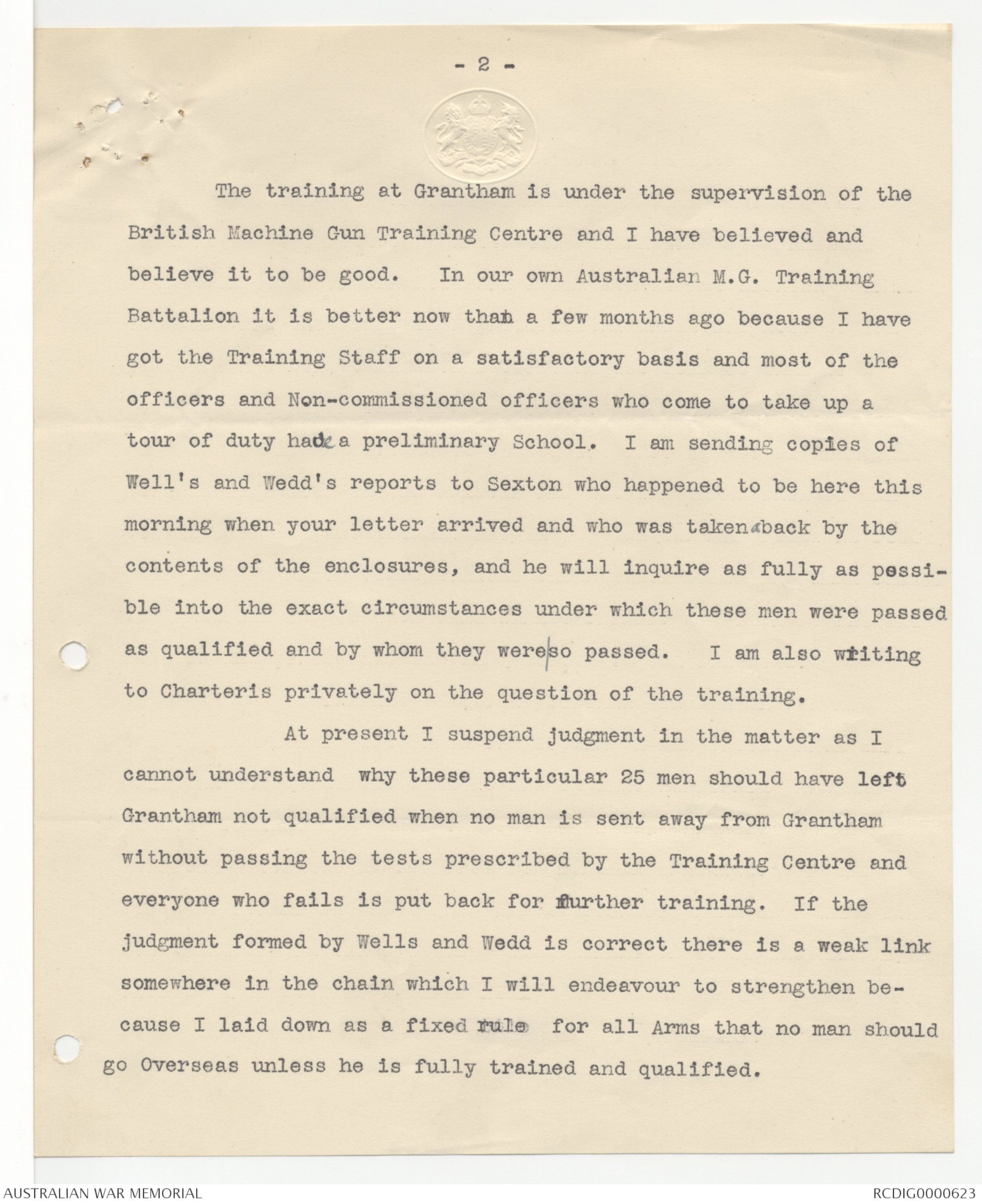
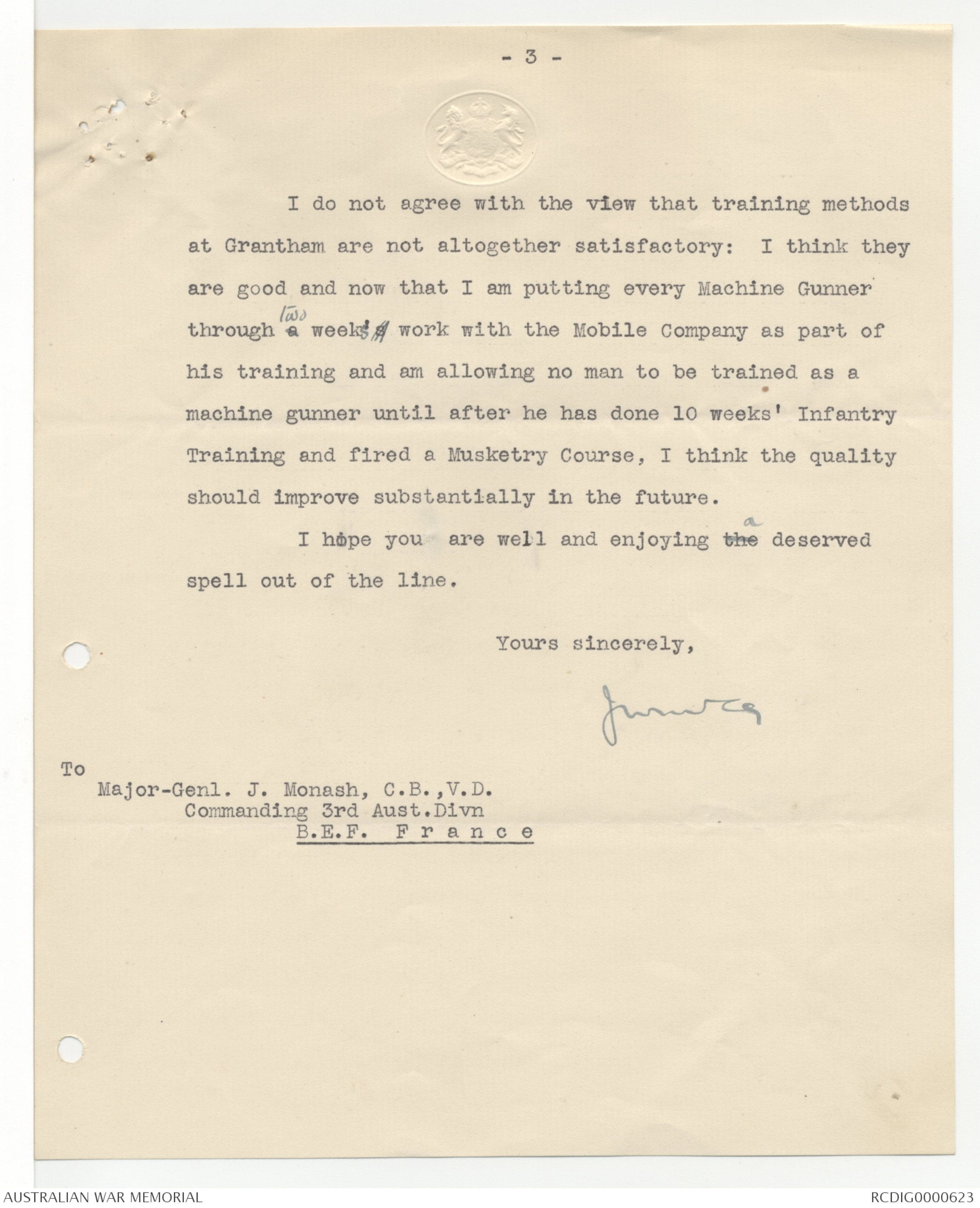
(2).
"D" is a Scheme which owes its creation to the 9th.
Brigade.
Both appear to approach more nearly to our requirements
than other Schemes which have been discussed up to date.
G. H. Jackson
Lieut-Colonel, -
General Staff.
DISTRIBUTION.
9th. Aust. Inf. Bde. . . . . . . 7.
10th do. . . . . . . 7.
11th do. . . . . . . 7.
Diagram "A" - see original document
Diagram "B"- see original document
Sir /
our No. Q 33/33
From A.D.M.S. (M. 56/30 of 29.4.17)
forwarding application by Private
Rutherford 9th Fld. Amb. for commission
in Light Horse.
To A.D.M.S. 1/5/17 asking for man to
parade at D.H.Q.
man interviewed by AQ 2/5/17.
No action taken.
re Pte. Rutherford
H.W.H.
23/9/17
File returned to Base
THIRD AUSTRALIAN DIVISION.
Divisional Headquarters,
23rd. September, 1917.
HEADQUARTERS
No G. 45/241.
THIRD AUSTRALIAN DIVISION
GENERAL STAFF CIRCULAR NO. 60A.
PROCEDURE TO BE ADOPTED FOR COLLECTION OF INFORMATION FROM
PRISONERS, DOCUMENTS, ETC.
----------
In the event of operations it will be necessary to arrange
strict procedure concerning the collection and forwarding of enemy
prisoners and documents. This is especially important, as we must rely
mainly on this method to obtain early information concerning enemy
counter-attacks.
Increasing stress is laid by Corps and Army on the importance
of ensuring that the fullest possible value is derived from these
sources of information. Commanding Officers are asked to impress on
those under them, the fact that all documents of any sort captured in
the enemy lines, or upon prisoners, must be forwarded promptly to
Divisional Cage. That papers appear not to be important, or that maps
do not appear to have anything on them, are not reasons for not forwarding
them. Enemy maps and sketches can be obtained afterwards from Corps
in cases where Officers wish to have them, but on no account should
they retain documents before Corps Intelligence has seen them.
The practice of using prisoners as carrying parties is strictly
against orders. There is no objection to making a batch of prisoners
on their way down from the firing line carry something with them, or help
carry their wounded down, as required; but it is a different matter to
use these prisoners as carrying parties back and forth during the day.
There are several reasons against it.
In the first case, these prisoners are badly wanted for interrogation
at Division, Corps and Army; and it is a very unsound policy
to use as a carrier all day a man who may be able to give ∧ invaluable
evidence towards the location and timing of enemy counter-attacks.
In the second case, German prisoners do not make good carriers;
their own Officers often have difficulty in inducing them to go into the
firing line these days - our men, if the practice were carried out to any
great extent, could not find the difficulty much less.
In the third case, such treatment gives the enemy opportunity
to say that we ill-use his prisoners and he will retaliate on our own men
whom he captures.
Both prisoners and documents - whether found in the prisoners'
tunics, or captured in dugouts in the enemy lines - are urgently wanted
at Divisional Cage. Their timely delivery may save many hundreds of
lives of our men in the line.
A list of men in each Battalion who can read German will be
furnished by Brigades to Divisional Headquarters, and kept up to date
from time to time. The ability of men to read a little German, rather
than their fluency in speaking the language, is what is required. These
men, or some of them, will be told off under Brigade arrangements for
searching of dugouts in the enemy lines after the attacking waves have
gone over. An N.C.O. should be in charge of them and supervise their
activities under Brigade orders. They will search enemy dugouts as
thoroughly as possible for maps and papers, collect these in sandbags,
and the N.C.O. in charge will arrange for their prompt despatch to
Divisional Cage - sending them, where possible, with prisoners' escorts.
The searching of captured Officers and N.C.Os for papers
should be done, if practicable, in the forward area; failing that, by
the A.P.M's police as soon as possible. Officers and N.C.Os will frequently
seek to destroy such papers if they are allowed to retain them.
P.T.O.
(2).
Papers will not be taken from Private soldiers - this is done at the
prisoners' cage. In no case will identity disc or paybook (soldbuch)
be removed from a prisoner. All ranks should be informed of this.
It is of great importance that strict discipline among
prisoners should be maintained by all escorts. Escorts should be impressed
with the fact that it is their duty to watch prisoners as well
as to bring them in. Escorts, whether of Line Infantry or A.P.M's
Police, will see that prisoners -
(a). Are not given food or drink before their arrival at the
Divisional Cage.
(b). Are not allowed to talk to each other, especially when halted,
and especially that Officers do not talk to their men.
Officers should be separated from the men as soon as possible
for this reason, and whenever a batch of prisoners is halted.
(c). March in proper order and when halted are not allowed to
leave their places in the squad.
Prisoners will on no account be interrogated, save in
circumstances of great emergency, until they arrive at Divisional Cage.
The only departure allowed from this rule is in the case of a Company
or Battalion Commander on the spot who is urgently in need of information
of tactical importance. In such case he should not delay all
prisoners, but should temporarily detain only one or two, and send the
remainder on with all speed.
S. H. Jackson
Captain. -
General Staff
D.C.
DISTRIBUTION.
9th. Aust. Inf. Bde. . . . . . . 23.
10th do. . . . . . . 23.
11th do. . . . . . . 23.
A.P.M. . . . . . . . . . . . . 1.
GOC/rw
27/9/17
Headquarters
A.I.F. Depots in U.K.
Bhurtpore Barracks,
TIDWORTH: W i l t s
24th Sept. 1917
My dear Monash, -
I have just received your letter of the 20th
with its two enclosures relating to 25 men in the 23rd Machine
Gun Company. It has given me rather a shake because all my
reports from France for the last 2 or 3 months have been to
the effect that the Machine Gun training was good. Colonel
Hoare, Corps Machine Gun Officer, expressed that opinion and
your Major Wells said the same thing to Sexton when last
in England.
The position is that now that Major Wells and
Lieutenant Wedd say the 25 men named are not qualified, while
the Company Commander and British Captain who tested them at
the end of their course at Grantham passed them as qualified,
and two other British Captains who were doing training duty
with the 23rd and 24th M.G. Companies while they were at Parkhouse
told me a few days before the Companies sailed Overseas
that all the men in the 23rd Company were qualified Machine
Gunners and this remark would cover the first 20 of the 25
though it might not cover the 5 who marched in from Grantham
on the 27th August.
- 2 -
The training at Grantham is under the supervision of the
British Machine Gun Training Centre and I have believed and
believe it to be good. In our own Australian M.G. Training
Battalion it is better now that a few months ago because I have
got the Training Staff on a satisfactory basis and most of the
officers and Non-commissioned officers who come to take up a
tour of duty had a preliminary School. I am sending copies of
Well's and Wedd's reports to Sexton who happened to be here this
morning when your letter arrived and who was taken aback by the
contents of the enclosures, and he will inquire as fully as possible
into the exact circumstances under which these men were passed
as qualified and by whom they were so passed. I am also writing
to Charteris privately on the question of the training.
At present I suspend judgment in the matter as I
cannot understand why these particular 25 men should have left
Grantham not qualified when no man is sent away from Grantham
without passing the tests prescribed by the Training Centre and
everyone who fails is put back for further training. If the
judgment formed by Wells and Wedd is correct there is a weak link
somewhere in the chain which I will endeavour to strengthen because
I laid down as a fixed rule for all Arms that no man should
go Overseas unless he is fully trained and qualified.
- 3 -
I do not agree with the view that training methods
at Grantham are not altogether satisfactory: I think they
are good and now that I am putting every Machine Gunner
through a ∧ two weeks's work with the Mobile Company as part of
his training and am allowing no man to be trained as a
machine gunner until after he has done 10 weeks' Infantry
Training and fired a Musketry Course, I think the quality
should improve substantially in the future.
I hope you are well and enjoying the ∧ a deserved
spell out of the line.
Yours sincerely,
JWMcCay
To
Major-Genl. J. Monash, C.B.,V.D.
Commanding 3rd Aust. Divn
B.E.F. F r a n c e
 Kate Benn
Kate BennThis transcription item is now locked to you for editing. To release the lock either Save your changes or Cancel.
This lock will be automatically released after 60 minutes of inactivity.